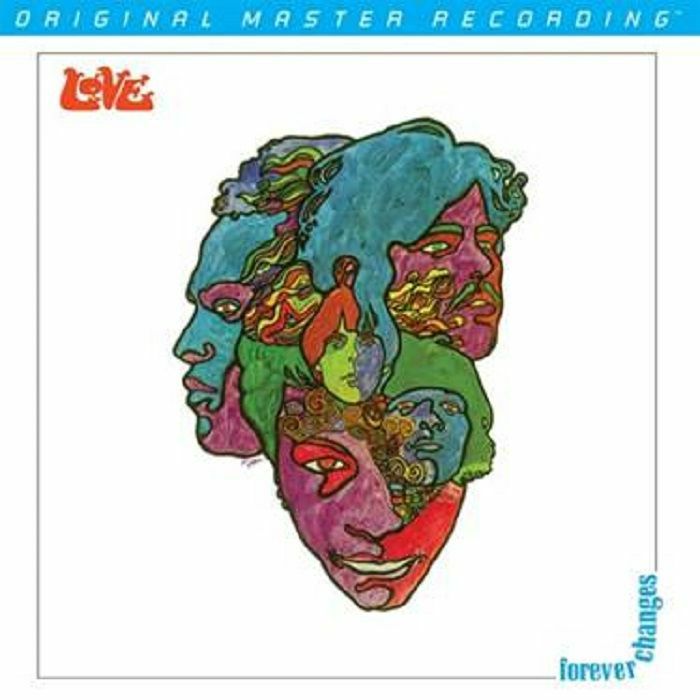Dusted Down – Love – Forever Changes (Mobile Fidelity Sound Lab Inc)
Arthur Lee and co bring a whole lotta Love

Love – Forever Changes (Mobile Fidelity Sound Lab Inc)
By the summer of 1967, the US counterculture was in full swing. The anti-Vietnam War movement was gaining traction across the States. The “summer of love” had taken root in San Francisco, bringing vast amounts of people to the neighbourhood of Haight-Ashbury. Aided by the popular use of drugs like LSD and psilocybin, psychedelic rock had reached enormous audiences through the likes of Jefferson Airplane, The Beatles, and The Doors. But not all bands were entirely comfortable within this subculture. Despite their association with psychedelia and frontman Arthur Lee’s self-proclaimed status as the “first black hippie”, LA-based rock band Love were conscious – perhaps from experience – of the darker underbelly of the era. With their beloved 1967 record, Forever Changes, this scepticism became apparent, adding an unseen depth to the oft-romanticised era.
The opening song, ‘Alone Again Or’ – often touted as the band’s greatest achievement – was also their biggest hit, a Spanish-influenced masterwork complete with an unforgettable use of a mariachi band. It remains a perfect pop song, shifting effortlessly from melancholic, unaccompanied guitar-picking to bombastic orchestration. The discordance between the uplifting arrangements and the lyrical subject matter adds another layer. Andrew Maclean’s lyrics, aided by Arthur Lee’s sensitive vocal performance, describe an unreciprocated love in an era of free love. Moments after the distinctly hippyish line, “you know that I could be in love with almost everyone”, Lee subverts the era’s communalism with the iconic delivery of “and I will be alone again tonight my dear”.
The following ‘A House is Not a Motel’ is a classic folk-rock tune, full of eery imagery and psychedelic lyricism. The paranoid, grim visions of the second verse were reportedly inspired by Lee’s odd interaction with a traumatised Vietnam War veteran. ‘Andmoreagain’ is a strange, gentle song, Lee’s haunting voice acquiring the tone of an old English folk singer. Here, Lee shows his immersion in the decade’s newfound spirituality, describing his relationship to the material world. His writing here is difficult to decipher, initially seeming almost nonsensical.
The most driving cut on the record, ‘The Daily Planet’, was initially arranged by Neil Young, a fitting appearance given the album’s folk-rock inclination. ‘Old Man’ sees Bryan MacLean take the reins from Lee. He sings with weary sensitivity, his voice occasionally shaking as if nervous.
‘The Red Telephone’, with its freak-folk stylings and doom-laden writing, is perhaps the most blunt exploration of Lee’s mindset. At its outset, Lee croons with clipped affect, “sitting on a hillside / watching all the people die / I’ll feel much better on the other side”. Despite the communal love and political optimism of the Summer of Love, Lee remained alienated and despondent. In the words of Andrew Hultkrans, “for him, the glittering surface of the Age of Aquarius obscured an undertow of impending doom”. This is a neat summation of the album’s overall tone; a filtering of 60s culture, music, and psychedelia through a cynical, depressive lens. ‘Maybe the People Would Be the Times or Between Clark and Hilldale’ parallels side A’s ‘A House is Not a Motel’. The interplay between brass and acoustic guitar returns for a driving highlight. As we close in on the end of Love’s opus, “You Set the Scene” forms an effective finale.
Forever Changes is one of the more intriguing releases to come out of the Summer of Love. Lee’s lyrics are both rooted in the counterculture’s politics and aesthetics whilst displaying a pessimism rare amongst his psych-rock contemporaries. Along with his label mate Jim Morrison, Lee introduced a subtle but haunting fatalism to an era often reduced to cliché.
Noah Sparkes
Pre-order your double vinyl copy of the half speed mastered re-issue of Forever Changes here